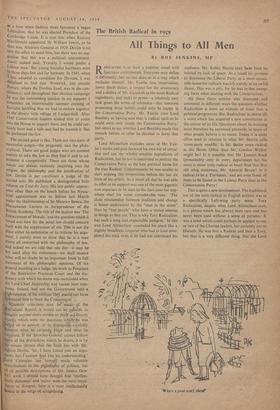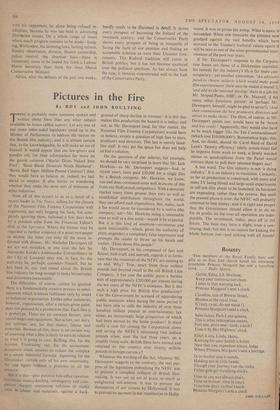The British Radical in 1959
All Things to All Men
y ROY JENKINS, MP
RADICALISM is at least a popular creed with Spectator contributorS. Everyone may define it differently, but no one does so in a way which excludes himself. Mr. Fairlie lists imperialism, lower death duties, a respect for the aristocracy and a dislike of Mr..Gaitskell as the main Radical ingredients, and seeks to prove—a relatively easy task given the terms of reference—that someone possessing these beliefs could only be happy in the Conservative Party. Mr. Fairlie cites Lord Boothby as having said that 'a radical such as he could exist only inside the Conservative Party,' but omits to say whether Lord Boothby made this remark before or after he decided to leave that party. • Lord Altrincham explodes some of Mr. Fair- lie's myths and puts forward his own list of attrac- tive and (on the whole) sensible ingredients of RadicalisM, but he too is concerned to portray the Conservative Party as the best political home for the true Radical. Unfortunately he was unable to start arguing this proposition before. the last six lines of his article. As a result all that he was able to offer in its support was one of the most gigantic non sequiturs to be seen in-the-Spectator (or any- where else) for some considerable time: 'The close relationship between tradition and change is better understood by the "man in the street" than by "top people" who have a vested interest. in things as they are. That is why Tory Radicalism has such a long and respectable pedigree.' In this way Lord Altrincham concluded his piece like a slightly breathless conjuror who had at least com- pleted his trick even if he had not convinced his
audience. Mr. Robin Marris may have been in- hibited by lack 'of space. As a result his promise to denounce the .Liberal Party as a most unsuit- able home for radicals was left merely as an awful threat. This was a pity, for he was in fine sweep- ing form when dealing with the Conservatives.
All these three articles also discussed and answered in different ways the question whether Radicalism is more an attitude of mind than a political programme. But 'Radicalism' is, above all, a word which has acquired a new connotation in the course of its life. Questions about its meaning must therefore be answered primarily in terms of what people believe it to mean. Today it is quite often used in relation to what Mr. Marris calls 'cross-party muddle.' Is Mr. Butler more radical at the Home Office than Mr. Gordon Walker might be? Is it possible that Mr. Lennox- Boyd (presumably only in every department but his own) is more truly radical at heart than that fine old whig statesman, Mr. Aneurin Bevan? Is it radical to be a 'European,' and are even fewer of them to be found in the Labour Party than in the Conservative Party?
This is quite a new development. The traditional use of the term radical in English politics was in a. specifically Left-wing party sense. Tory Radicalism, despite what Lord Altrincham says, is a phrase which has always been rare and has never been used without a sense of paradox. It was a label which could perhaps be applied to one or two of the Chartist leaders, but certainly not to Disraeli. He was first a Radical and then a Tory, but that is a very different thing. Nor did Lord 'Where's your scarf, then?
Randolph Churchill either use the term about himself or expect anyone else to use it. It finds no place in the index either of his life by his son or of the new life by Mr. Rhodes James. Tory Democracy, on the other hand, attracts a great number of references in both. But this was not a synonymous phrase. Indeed, in his Birmingham speech of April, 1884, which was of decisive im- portance for the development of his popular appeal, Lord Randolph saw no contradiction between advocating Tory Democracy and attack- ing Radicalism: 'The law of perpetual change which is the motive principle of the Radical,' he rather contemptuously said, 'exercises its fatal effect upon the Radical himself. . .
By the early years of this century, the word radical had if anything assumed an even more specifically political meaning. Some Left-wing Liberal Members regarded it as sufficiently pre- cise to choose it as a personal designation in par- liamentary reference books. 'A Radical, in favour of self-government for Ireland, temperance, social and labour reforms' was how the Member for Brentford rather forbiddingly described him- self in the 1906 edition of Dod. But its main use was as a slightly pejorative synonym for Liberal in Conservative speeches. It owed its use to much the same feeling that prompts the Daily Mail and the Daily Express always to write 'Socialist' rather than 'Labour' and makes, say, Mr. Michael Foot feel that 'Tory' is a much more expressive adjective than 'Conservative.' There are many things still obscure in the long catalogue of revolu- tionary changes advocated by new Ministers,' Balfour wrote in his 1906 election address, 'but some things are plain enough—Home Rule, dis- establishment, the destruction of voluntary schools, and the spoliation of the licence holder have lost none of their ancient charm in the eyes of Radical law-makers.'
In the sense in which the word had meaning, at least until 1918, it therefore seems impossible to sustain the view that Radicalism is more an affair of personality than of politics. Streaks of icono- clasm such as Lord Randolph Churchill possessed were certainly not enough to make a man either earn or covet the label. The point gains force when it is realised how deeply conservative have been the habits of mind and patterns of personal behaviour of the men who have been most suc- cessful in carrying through Radical legislation. Gladstone, Asquith and Lord Attlee stand out as the reforming Prime Ministers of the past hun- dred years; yet it would be difficult to describe any one of them as a man of radical temperament as opposed to Radical political affiliations.
Despite this history, what a Spectator corre- spondent has aptly called the new 'take-over bid' approach to Radical assets has clearly gained ground in recent years. Is there any justification for the view that these assets, instead of being the automatic preserve of the Left, are now floating about somewhere in the centre of politics, more or less equally open to bids from different sides? This is quite untenable. There may be some dis- pute about the true Radical approach to a number of economic and social issues—although it is diffi- cult to believe that the recent Conservative mix- ture of economic stagnation and social service complacency can claim much in this direction— but there is surely no dispute that libertarian Home Office issues in Britain and relations with
subject peoples outside (particularly in Africa) are issues which are central to modern Radicalism.
On the first group there is an immense difference between the two main parties. The Conservative Party has a fringe of genuine libertarians and the Labour Party has a fringe of black obscurantists. But both these groups are untypical of their own parties. There is no comparison at all between the bulk of the Conservative Party and the bulk of the Labour Party. In the key division on the second reading of the 1956 Death Penalty Aboli- tion Bill the 288 affirmative votes were made up of 236 Labour Members, forty-seven Conservatives and five Liberals. Of the 264 votes for retention, 258 were Conservative and six were Labour. Roughly the same pattern of voting had pre- viously shown itself on issues such as divorce and Sunday observance. It has shown itself recently on the Obscene Publications Bill. And it would also show itself (although in a somewhat modified form) if the recommendations of the homosexual part of the Wolfenden Report were to be voted upon.
The position in the Conservative Party is still worse than this indicates. The Conservative Con- stituency Associations, solidly illiberal on these issues, have in the past few years developed an entirely new assertiveness. They have got rid of Mr. Nigel Nicolson—his attitude to hanging being almost as great a count against him as his attitude to Suez; and they have got rid of Mr. Montgomery Hyde, whose differences with the Government have been solely on Home Office issues. Not merely is there a likelihood of con- stant depletion of the libertarians in the Con- servative Party; in addition those who themselves escape the axe will have the sight of some very discouraging political corpses upon which to re- flect. The Labour Party, while far from perfect as a libertarian instrument, is an enormous improve- ment on this. There is not a single example of a Labour Member getting into serious difficulties with his supporters, let alone being refused re- adoption, because he was too bold in advancing libertarian causes. On a whole range of issues where much progress remains to be made—hang- ing, Wolfenden, the licensing laws, betting reform, Sunday observance, divorce, theatre censorship, police control, the abortion laws—there is immensely more to be hoped for from a Labour Home Secretary than from the most liberal Conservative Minister.
Africa, after the debates of the past two weeks, hardly needs to be discussed in detail. It shows every prospect of becoming the Ireland of the twentieth century; and the Conservative Party shows every prospect of being as incapable of facing the facts of our position and finding an acceptable solution as were their Unionist fore- runners. The Radical tradition still exists in British politics, but it has not become spattered over the political spectrum. As has always been the case, it remains concentrated well to the Left of the Conservative Party.




































 Previous page
Previous page